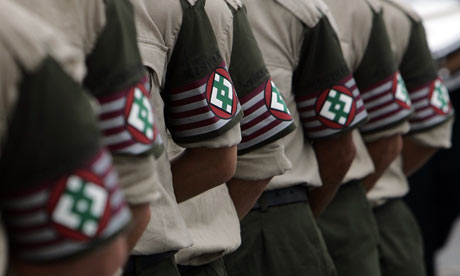 While U.S. President Barack Obama makes history in Cairo this week, a new regional grouping is taking shape in the northern part of the Middle East which could turn out to be equally significant.
While U.S. President Barack Obama makes history in Cairo this week, a new regional grouping is taking shape in the northern part of the Middle East which could turn out to be equally significant.
Turkey, Iran, Iraq and Syria are developing trade, energy and security ties which signal a common will to shape their national destinies free from external – and especially Western — dictation. What are the factors driving this new grouping? They are numerous, and mostly specific to each country.
Turkey – having faced disagreements and disappointments with the U.S. (over the Iraq war), with the European Union (over the slow pace of accession negotiations) and with Israel (over the Palestine question) — has developed an ambitious regional policy towards its Arab and Islamic neighbours.
Turkey’s trade with Iran, which was a mere $1bn in 2000 rose to $10bn in 2008, and is projected to double to $20bn in the not too distant future. Turkey is planning to invest $12bn in Iran’s South Pars gas field – a policy strikingly at variance with the call by Israel and its American friends for additional sanctions against Iran. Some one million Iranian tourists visit Turkey each year, and millions more visit Iraq, especially Kerbala, the place where Hussein, grandson of the Prophet Muhammad was martyred in 680. His tomb is the Shi‘is holiest shrine.
Syria’s strategic partnership with Iran is now 30 years old, and shows no sign of waning. The Tehran-Damascus-Hizballah axis is a geopolitical fact of life in the region and was widely seen, during in the Bush years, as the main obstacle to U.S.-Israeli hegemony. In contrast to his predecessor, Obama is now seeking to reach out to both Iran and Syria, but he is apparently not yet ready to recognise that Hizballah is an unavoidable actor on the Lebanese scene. If Obama’s ambitious Middle East peace plans are to be realised, a U.S. dialogue with both Hizballah and Hamas cannot be long delayed.
Syria’s relations with Turkey – strained almost to the point of war in 1998 over Syria’s backing of the Kurdish PKK leader, Abdallah Ocalan — have improved dramatically. Two-way trade is flourishing. A straw in the wind was the recent Turkish decision to increase the flow of Euphrates water to Syria’s north-east, which has been badly hit by drought.
Syrian-Iraqi relations, marked by extreme hostility during Saddam Hussein’s rule, have also greatly improved. Last April, Syria’s Prime Minister Muhammad Naji Otri signed a wide-ranging agreement in Baghdad establishing a free trade zone and providing for cooperation in energy and education. Syria is to participate in the rehabilitation of the Kirkuk to Banias oil pipeline which passes through Syrian territory. Syria’s port at Latakia is to be expanded and road links to Iraq improved, to provide transit facilities for Iraq’s import- export trade. A train carrying 800 tons of steel left the Syrian port of Tartous on 30 May for Baghdad, the first rail freight trip between the two countries in decades.
Iran, Turkey, and Syria all have a stake in Iraq’s future. Iran would clearly like Iraq to be a friendly neighbour under continued Shi‘i leadership. It wants Iraq to revive, but never again to be so powerful as to pose a threat as deadly as Saddam Hussein’s. Memories of the 1980-88 Iran-Iraq war are still too recent. Iran would probably prefer Iraq to develop into a federal state, and therefore relatively weak, rather than a strong unitary state. There are, however, no illusions in Tehran that Iraq, a major Arab country with a strong nationalist tradition, will ever consent to be an Iranian puppet.
Whoever wins the Iranian presidential elections on 12 June – whether it is the conservative incumbent Mahmoud Ahmadinejad, or his principal challenger, former premier Mir-Hussein Mousavi, a ‘moderate’ conservative backed by the main reformist parties – the main lines of Iran’s external policy are unlikely to change: close ties with Syria, Iraq and Turkey; opposition to Sunni extremism in Afghanistan and Pakistan; support for Hizballah and the Palestinians; and continued uranium enrichment.
What sort of Iraq, its neighbours wonder, will emerge from the slaughter, destruction and chaos of the past six years? Can a new regional balance be reached now that Iraq is again able to assert its national interests?
It seems clear that Iraq has turned a corner. Violent deaths in May, at about 165, were among the lowest for any month since the U.S.-led invasion of 2003. Security is gradually returning, although still marred by horrendous suicide bombings. The Iraqi security forces – army, police, and intelligence — are steadily improving in size and efficiency. The recent conclusion of a Status of Forces Agreement (SOFA) with the United States — with firm deadlines for the withdrawal of American armed forces — was an important expression of Iraqi sovereignty regained.
But much remains to be done. Sunni-Shi‘i relations in Iraq remain tense, while Arab-Kurdish relations remain problematic; a hydrocarbons law has not yet been passed by parliament (although the central government has thought it best to turn a blind eye to the start of oil exports from the Kurdish region to Turkey.)
War of Necessity, War of Choice, a recent book by Richard Haas contrasts the 1990 war to free Kuwait with the 2003 war to overthrow Saddam Hussein. The first, he argues was a war of necessity, the second a war of choice — and a very bad choice at that. It had a catastrophic impact on America’s armed forces, on its finances and its reputation. The Iraq war killed hundreds of thousands of Iraqis, displaced millions, shattered the country’s infrastructure, released sectarian demons, and upset the regional balance to Iran’s great benefit.
Haas, a former senior American official, is now head of the prestigious New York–based Council on Foreign Relations. His book makes clear that Saddam’s alleged possession of Weapons of Mass Destruction was not the real motive for war. Pressure to attack Iraq came essentially from the civilian leadership at the Pentagon – especially from the then deputy defence secretary Paul Wolfowitz – and from other neo-cons in Vice-President Dick Cheney’s office, whose geopolitical fantasy was to overthrow the main Arab regimes, as well as the mullahs in Iran, and restructure the entire area, so as to make it safe for Israel.
The neo-cons’ opportunity came because of America’s perceived need, after the 9/11 terrorist attacks, to send a big message to the Arab world about U.S. military power. Haas’ book is likely to revive the debate about the role of Israel’s friends in Washington in pushing the U.S. into war in Iraq. It will provide Barack Obama with ammunition to resist Israeli pressure to attack Iran.
The grouping of Turkey, Iran, Iraq and Syria may not yet be a full-fledged alliance, but numerous common interests are pulling the four states in that direction. Not least is a concern about possible Israeli aggression – directed against Iran and Syria – and of continued uncertainty about the future course of American policy.
Source: www.daralhayat.com, 06 June 2009






